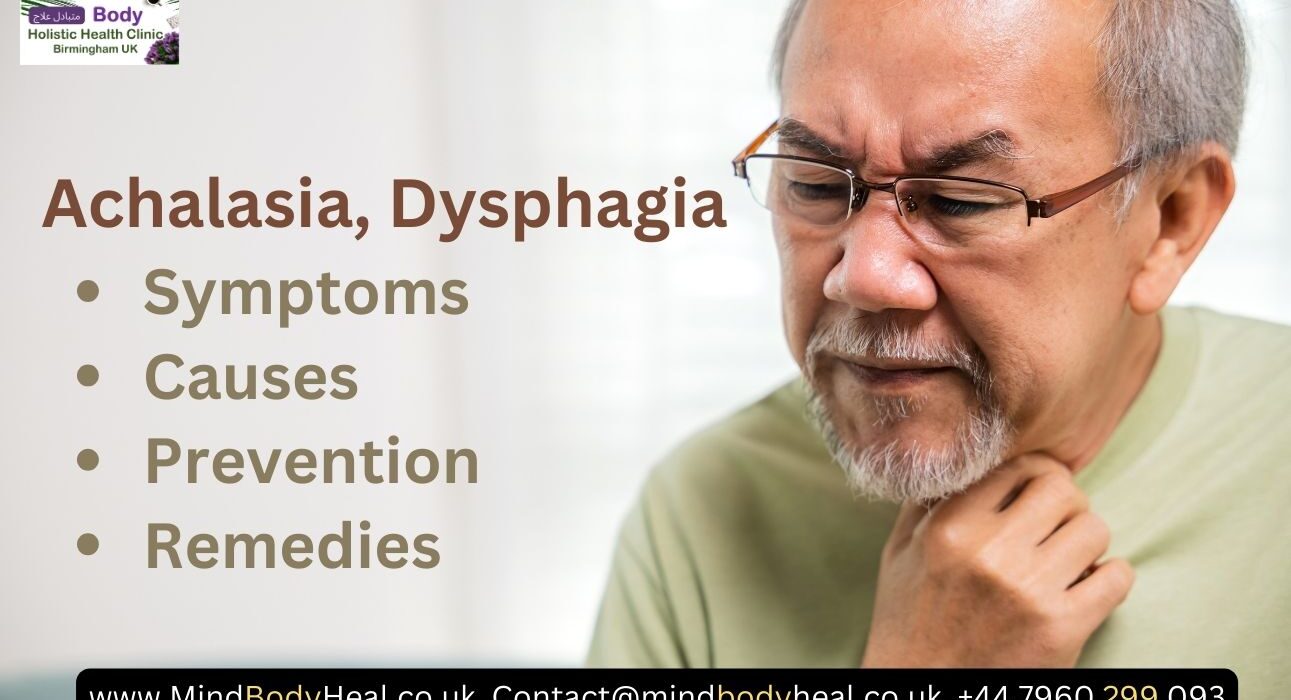Achalasia, Dysphagia i.e., difficulty in swallowing
Difficulty in swallowing solids or liquids is called dysphagia. Some people with dysphagia have problems swallowing certain foods or liquids, while others can’t swallow at all. Patients may feel like “the food has got stuck.”
POSSIBLE CAUSES
- A condition that affects the nervous system, such as a stroke, head injury, multiple sclerosis or dementia
- Enlarged tonsils.
- Cancer of the oral cavity i.e., mouth or oesophageal etc.
- Fungal infection of the mouth.
- Cerebro-vascular accidents.
- Motor neuron disease [a nerve disorder].
- Myasthenia gravis [fatigue and exhaustion of the muscular system with progressive muscular paralysis].
- Parkinsonism [a group of neurological disorder marked by diminished motor activity, tremor and muscular rigidity].
- Pharyngo-oesophageal diverticulum [pouch/sac].
- The muscles and nerves that help move food through the throat and oesophagus are not working right.
- Post-cricoid web.
- Achalasia [failure of the sphincter at the junction of the oesophagus and the stomach, to relax].
- Diffuse oesophageal spasm.
- Gastro-oesophageal reflux disease (GORD) – where stomach acid leaks back up into the oesophagus
- Abnormal course of subclavian artery.
- Peptic stricture.
- External compression from mediastinal masses.
- Dilated left atrium [chamber of heart] in mitral stenosis.
SIGN AND SYMPTOMS
- Difficulty in swallowing solids or liquids or both.
- Nasal regurgitation or cough, while swallowing.
- Having pain while swallowing (odynophagia)
- Being unable to swallow
- Having the sensation of food getting stuck in your throat or chest or behind your breastbone (sternum)
- Drooling
- Being hoarse
- Bringing food back up (regurgitation)
- Having frequent heartburn
- Having food or stomach acid back up into your throat
- Coughing or gagging when swallowing
- Having to cut food into smaller pieces or avoiding certain foods because of trouble swallowing.
- Difficulty in swallowing when watched by others [in Parkinsonism].
- Sensation of fullness in the middle of the chest with a feeling as if the food had stopped somewhere along the oesophagus.
- Regurgitation relieves pain and fullness in the centre of the chest.
- Choking when eating.
- Recurrent pneumonia.
- Inability to control saliva in the mouth.
- Lose weight because you are not getting enough food or liquid.
- Being unable to chew food properly.
- A gurgly, wet-sounding voice when eating or drinking
- Over time, dysphagia can also cause repeated chest infections.
- Need to drink water while eating.
- Can lead to malnutrition.
DIETARY & LIFESTYLE MANAGEMENT
- Treat the cause.
- Eat soft, semisolid or mashed food, which is easy to swallow.
- Consume soups – vegetable, tomatoes, and green leafy vegetables etc.
- Have fruits juices, sugarcane juice, buttermilk, and milk etc.
- Make different porridge- wheat porridge, rice porridge or lentil porridge etc.
- Boil food properly and then mash it so it’s easy to swallow.
- Try to make different varieties so all nutrients are consumed to prevent malnutrition.
- Eat small quantities of food at regular intervals.
- In severe cases where food is supplied to the body through food pipe, feed different varieties of soups, porridge and juices.
- Do not speak while eating.
- Eat your food very slowly.
- Chew the food well.
For your particular health problem(s), or to change your medications it is strongly suggested to avoid self-medication and consult your GP / health provider or Mind & Body Holistic Health Clinic.
Please click the link below to buy your 1st line complimentary remedies kit.
https://mindbodyheal.co.uk/product/achalasia-dysphagia-1st-line-complimentary-remedies/
If you are interested in such health-related informative content, please make sure to follow our YouTube channel.






